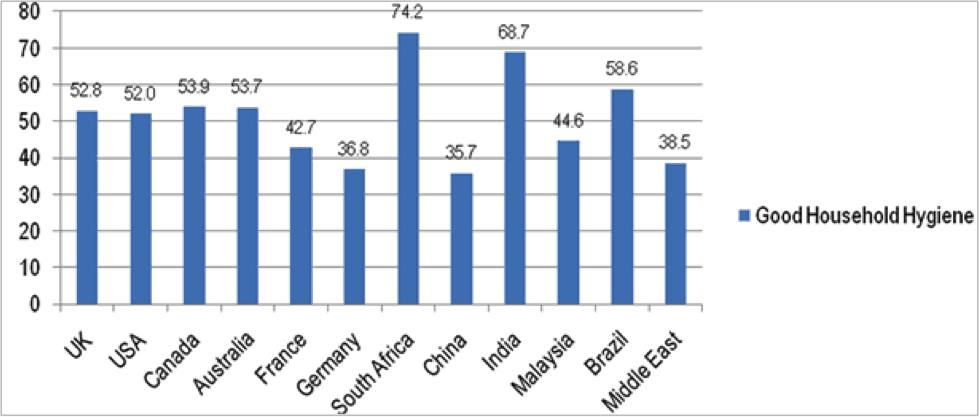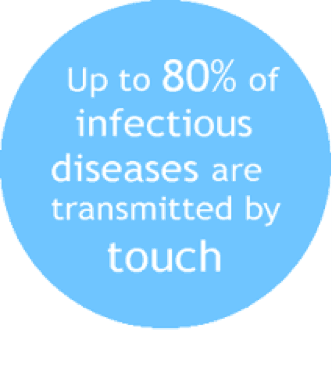Yep, that’s the same face that every mom makes when she brings out her broom, mop, dusting rags, and whatnot. It’s enough to make every individual at home scamper for cover – or if they are lucky enough, escape altogether.
Needless to say, cleanliness is important. And healthy habits are essential for a healthy existence. It all boils down to hygienic practices.
What is hygiene?
Hygiene is an umbrella term that includes any practice or activity that you do to keep things healthy and clean. This comprises of basic things such as washing your hands, brushing and getting your kids to floss every day, coughing into your elbow, and cleaning your house regularly.
Collins dictionary defines hygiene as:
“The practice of keeping yourself and your surroundings clean, especially to prevent illness or the spread of diseases.”
A study at Duke University found that more than 40% of the actions we perform daily aren’t actual decisions, but habits. So implementing the right ones early on is a great way to teach your kids how to stay healthy.
Percentage with high household hygiene score

Getting started
The internet is overflowing with information about personal hygiene. And though that is the first line of defense, I want to discuss something a bit more diverse.
As the caregiver of the family, it is essential that you maintain a hygienic environment. This reduces the chances of spreading diseases and illnesses.
So start off by developing an excellent daily system. Remember to begin with the basics and build up a regular routine. It may seem demanding at first, but in no time at all, you’ll see the results and reap the rewards.
All you need is a bit of motivation. What you do every day will have a direct impact on the quality of your life. So it’s time to adopt the following habits and start transforming your life today.
Shall we begin?
1. Wash your hands
If you want to improve hygiene, wash your hands more often. Simply use a hand sanitizer or wash up with soap and water. It’s necessary to get rid of the germs on your hands, especially after using the bathroom, throwing away the garbage, before making food, and after eating it. That way you’ll snip the spread of germs in the bud.

2. Remove the clutter
We live in a period where the generation believes in ‘too much’. So the first step is to get rid of everything you don’t need. Less clutter equates to less mess. So it’s easier to clean and maintain a house where few, essential belongings exist.
Don’t let things pile up, whether it is the laundry or the dishes. Discard junk mail as soon as possible. As you move from room to room, pick up items that you don’t need. Most importantly, enforce the rule, “If you take it out, you’ve got to put it away.”
3. Maintain your kitchen
Even though this could be an entire blog on its own, let’s stick to the bare minimum.
A kitchen is the center of livelihood of every home. Full of life and activity, it tends to get the dirtiest. A few daily habits are enough to keep everything spick and span.
- Clean up spills right away
- Wash the dishes as soon as the meal is over
- Minimize clutter by limiting the number of cookware you use
- Cook only the amount of food you need
- Keep perishable items in the fridge
- Use separate equipment (gloves, knives, cutting boards, etc.) for meat and vegetables
- Clear and wipe your counters daily
- Sweep the floor so that the mess does not travel deeper into your home
- Give the sink a quick scrub
Though it may initially seem like a lot, once you incorporate them into your daily routine, it won’t take more than a few minutes every night. And you’ll be happy with what you did when you walk into a clean, organized kitchen the next morning.
The fig below depicts the Sites and surfaces based on risk of infection transmission:

4. Empty the garbage
The dustbin is one of the dirtiest objects in a household. Keeping it clean is an easy way to avoid attracting various pests like cockroaches and house flies.
Make sure to throw out the trash every night. Keep the lid closed to prevent flies. And since it’s bound to get stinky, wash the garbage can with hot water and a liquid cleaner at least once a week.
5. Give your bathroom a once over
Bathrooms also need a great deal of attention. This article is about daily routines, so for starters, you need to keep your bathroom dry and clutter-free.
- After a shower, wipe down any wet surfaces, such as the floor, walls, tub, and doors. Wet bathrooms are hotspots for mold growth.
- Simply leave the bathroom door open to let the steam escape. Opening windows or vents could get the job done faster.
- Remove wet towels from the bathroom. Let them air out or pop them into the drier.
- Remove dirty clothes from the bathroom. Sweaty, grimy attire harbor germs, so dump them in the hamper.
- Wipe the sink and countertop. Put the cap on the toothpaste (a daily chore for many).
- And remember to give the toilet bowl and bathroom tiles a good scrub every couple of days.
6. Don’t forget to dust
Dust is like an uninvited guest. It’ll make room for itself anywhere and everywhere. And it doesn’t respect your boundaries either!
A swift wipe down of surfaces like the coffee table, bookshelf, vanity, and anything else in plain view covered with dust is enough for a daily routine. But get down and dirty at least once a week. Bring out the vacuum, shake out the doormats, dust the walls, clean the chandeliers, and wipe the ceiling fans.
Every once in a while, have a go at the sofa and other furnishings to eliminate debris and pet hair.
7. Don’t skip your bedroom
The most logical place now would be the bedroom. Though you should change your sheets at least every two weeks, you should make your bed every morning. Keep your belongings organized.
A clean and tidy room is the ideal place to unwind. So fold your washed clothes as soon as they come out of the drier. Keep your dresser area and combs hair-free. And never eat in the bedroom. The last thing you want is to share your bed with other critters.
Don’t pile up your belongings on your bed. Nasty pests like bed bugs often attach themselves to clothes and bags. You don’t want them ending up on your bed. But just in case you notice any lurking under the covers, use home remedies for bed bugs to get rid of them.
So I guess now you’re set for the night. Remember, if you can’t do it all, be satisfied with the 80/20 rule. When you’ve covered 80% of your daily tasks, you’re good to go.
Over to you
There’s no place like home. Depending upon the number of people that you live with and their ages, you will need to set a routine to manage the level of cleanliness. Homeowners with young kids and pets will require a more rigorous method.
At the end of the day, it’s all about maintaining good practices that help to keep your surroundings spotless. If you feel like you are not able to keep up with the housekeeping demands of your lifestyle, there is no harm in hiring some help.
But it’s not only about keeping your abode in pristine condition. Your habits will affect other areas as well, such as your workplace or your child’s school. So your positive attitude towards hygiene can go a long way in influencing others to do the same.







